Herb Garden Basics: 5 Tips for the Bestest Herb Garden Ever!
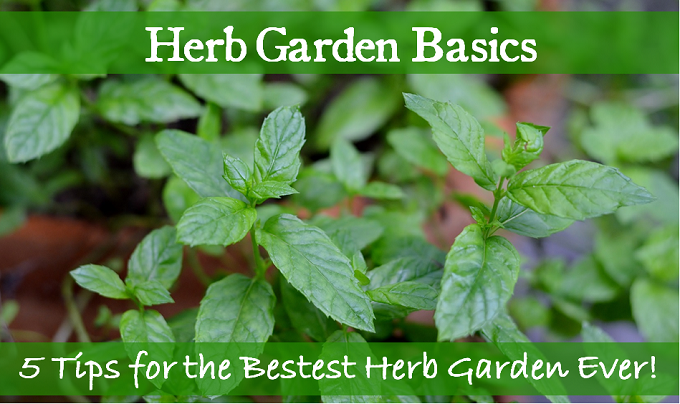
Herb gardens are all the craze these days. But that’s really nothing new…herbs have been used for all sorts of reasons for centuries. They’re really easy to grow, have all sorts of uses, and probably give you the biggest bang for your food gardening buck.
So if you’re considering trying your hand at growing food at home, an herb garden is a great first step. To help you on your way, below you’ll find 5 basic herb garden tips. I hope you find them helpful.
![]()
Tip #1: Think beyond your tongue.
Yes…the right herbs can enhance the taste of most any dish. But there are so many other uses and benefits of herbs. So to get the most out of your herbal endeavors, you really should think beyond your tongue.
- Medicinal: For centuries, before the world was taken over by pharmaceuticals, people have used the medicinal qualities of herbs to address all kinds of health issues. In fact, most of the world still uses traditional, plant-based remedies…and most of modern-day drugs are derived primarily from plants. Just a few ways that you can expand your medicinal herbal horizons at home with some common herbs are:
- Lemon balm can be used in teas to calm your stomach and nerves…and so can peppermint.
- Likewise, cilantro is known to settle an upset stomach and is used as a detoxing agent.
- Using dried lavender in teas is said to calm you and even help with headaches.
- Beauty: With their varied leaves, flowers, and wide array of colors, herbs shouldn’t be limited to a few pots on your patio or a row or two in your garden. Plant them throughout your yard to add beauty and drama to most any outdoor space.
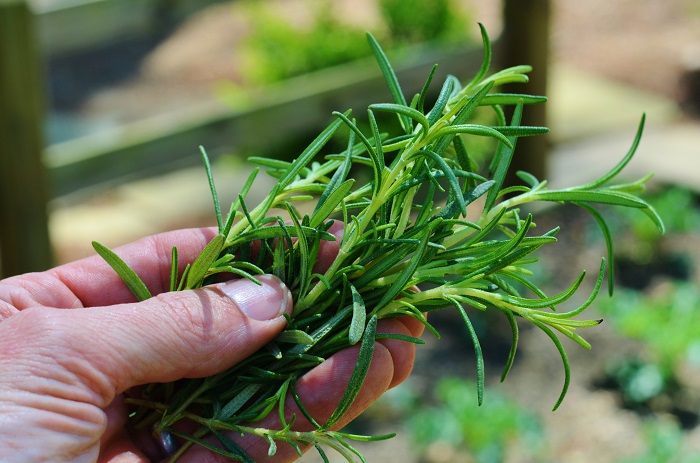
- Scent…and touch: One of the things I love most about having herbs is dragging my fingers over their leaves and bringing my hand to my face to smell their amazing aromas. Rosemary, mints, lavender, and basil are some of my favorites to do just that. I even put several of these herbal air infusers in a window box on our chicken coop to give me something better to smell than what else was wafting about.
- Repelling insects: Citronella, lemon balm, lavender, and peppermint…just to name a few, are known to ward off pesky insects.
- Attracting beneficial insects: Fennel, anise, and dill are three herbs that can be used to attract beneficial insects like lady bugs, dragonflies, lacewings, and spiders. These bugs are all excellent predators…killing many of a garden’s “Most Wanted”, like mosquitoes, aphids, mites, and mealybugs.
Tip #2: Know thy herbs.
Before you go planting herbs willy-nilly about your garden, there are a few things you should probably know.
- Type: Like other plants in your garden, there are all kinds of herbs.
- Annual herbs only last for a year…or more accurately, until winter’s cold kills them. Common annual herbs include: basil, dill, parsley, cilantro, and garlic.
- Although not as hardy as most perennial shrubs, perennial herbs last for a couple of years or more. They die back during the winter, but will sprout back to life in the spring. There’s a long list of common perennial herbs, including: mint, oregano, lemon balm, ginger, fennel, catnip, tarragon, horseradish, and chives.
- There are also evergreen perennial herbs…that have woody stems and stay green through the winter. My top picks and probably the most common are lavender and rosemary.
- Invasive herbs: There are some herbs that you should watch out for…as they could take over your part of the world if left to their own devices. Catnip, lemon balm, horseradish, mint, and St. John’s wort are some of the more invasive herbs. So be smart about where you plant them and be prepared to keep them under control. I’d suggest that you only plant these wily herbs in pots – especially mint, lemon balm, horseradish, and catnip…holding their underground runners at bay.
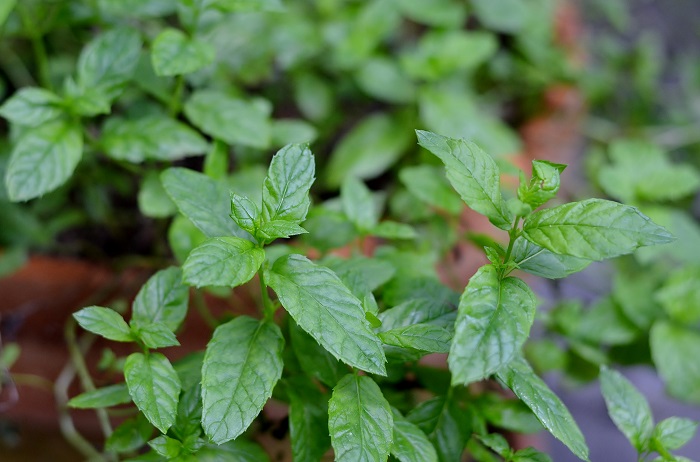
- Varieties of the same herb could be very different: When you go herb shopping make sure you read the labels very carefully. Otherwise the mint you bring home to sweeten your tea may do anything but sweeten it. So when in doubt, stick to what you know or ask the helpful sales associate at your local nursery…that’s what they’re there for.
Tip #3: Pick the right spot.
In order to be successful at growing herbs, you need to make sure you plant them in the right spot…but don’t limit yourself.
- Sunny spot…more or less: Like flowers, most herbs prefer a good amount of sunlight…about 6 hours a day. However, there are some herbs that are a bit more shade tolerant than others…like chives, lemon balm, mint, and parsley.
If you live in a hotter climate where temperatures get into the 90s and beyond, your herbs could get scorched in the direct afternoon sun. If that’s the case, you may want to put your herb garden where it gets direct morning sun, but dappled afternoon sun.
- Kitchen access: One of the things I like most about herbs is that they’re typically small and can be planted almost anywhere…assuming that the growing conditions are right. Given that you’ll most likely be using them for cooking, I’d suggest that you consider putting at least some of your go-to herbs where you have easy access to them from the kitchen.
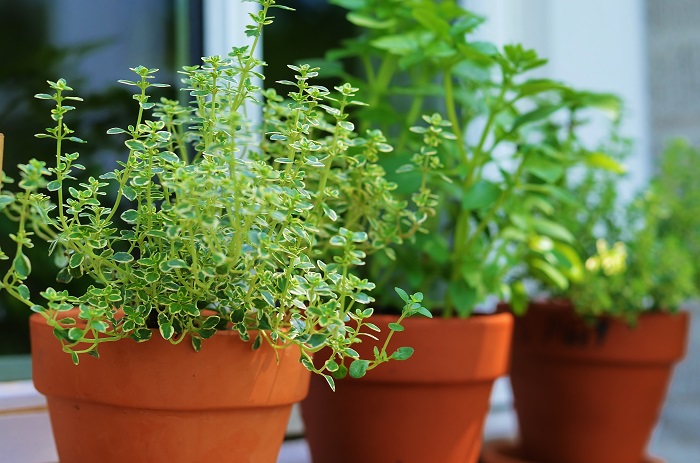
- Think outside the box…literally: Don’t limit yourself to planting herbs in the typical clay pot or the designated little herb garden. Again, as long as you have the right growing conditions, you can put them almost anywhere.
- Of course you could add herbs to your vegetable garden, but don’t stop there…think landscape beds, window boxes, and other containers. We have herbs planted throughout our yard.
- Given that we have a good amount of shade in our back yard, we grow a good number of sun-loving herbs in our Tower Garden®…that we can move to wherever the sun is…as long as the extension cord reaches that far.
- Right now we even have basil growing in a small container sitting on a sunny spot of our kitchen counter. Not only is this the ultimate in convenience, it brings a little life inside our home as well.
Tip #4: Show them a little love.
Herbs are really quite easy to grow. All you really need is some nutrient-rich and well-draining soil, sun, water, and possibly some fertilizer to give them a little pick-me-up. But there are a few other things to keep in mind when taking care of your herbal friends.
- Give them room to grow: As with any plant, check the label to see how much room your herbs need to grow. And this varies quite a bit: rosemary, mint and oregano could spread out to 3 or 4 feet; whereas some of your smaller, less aggressive herbs need only a foot of space…like cilantro, parsley, and chives.
- Ensure appropriate airflow: One of the reasons why you need to space your herbs appropriately is because they need a decent amount of airflow. This will not only help them form sturdier stems, but it will also help prevent mildew and other diseases.
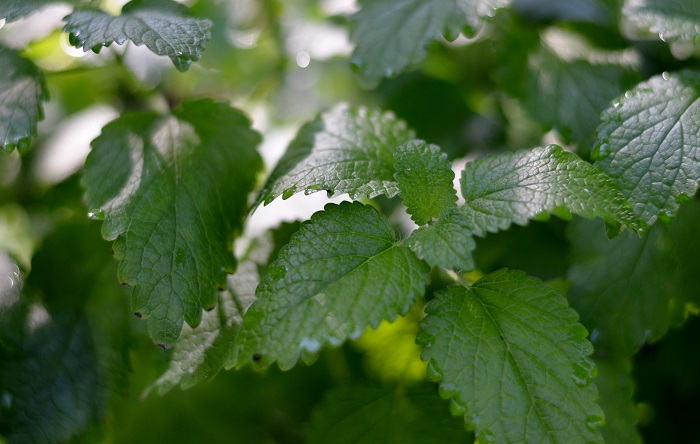
- Water judiciously: Herbs need water to stay healthy…but not too much and not too little. Depending on the climate, quality of soil, and the amount of rain you’ve had…the amount of watering you’ll need to do will vary greatly. A good rule of thumb is to check the soil a couple of inches below the surface…and if you come up dry, it’s time to give them a drink of H2O.
Tip #5: Harvest them right way, at the right time.
Harvesting herbs the right way and at the right time will help ensure that they’ll taste their best.
- The How: Harvesting herbs is easy peasy. Simply cut up to a 1/3 of a stem right above where two leaves are growing. In addition to gathering a tasty treat, you’ve essentially just pruned your herb…and pruning is essential to encourage bushy growth and keep your herb healthy and strong.
But note…although what I’ve shared above applies to herbs like basil, mint, and lemon balm… it’s a fairly generic explanation of how to harvest herbs. As I’ve stated before, herbs vary greatly. So take a few minutes to research the best way to harvest the specific herbs you have in your garden.
- The When: Ideally, you should harvest your herbs just before their flowers begin to unfurl. It’s also best if you make your harvesting rounds in the morning…just after the dew has evaporated. This is when the herb’s essential oils are most concentrated in its leaves…making them most flavorful. This of course will require that you plan a little bit ahead of time for dinner!
![]() I know all of this herbal information may be a bit daunting. I’m sorry if it is…and I hope it doesn’t make you think twice about growing herbs. But if it does, maybe you should step slowly into the world of herb gardening by starting out with a single basil plant. Enjoy some fresh pesto and tomato basil pie this year…learn a few things, and then move on from there. I’m certain you’ll be glad you did!
I know all of this herbal information may be a bit daunting. I’m sorry if it is…and I hope it doesn’t make you think twice about growing herbs. But if it does, maybe you should step slowly into the world of herb gardening by starting out with a single basil plant. Enjoy some fresh pesto and tomato basil pie this year…learn a few things, and then move on from there. I’m certain you’ll be glad you did!
Take care friends,

You may also enjoy these posts from RYG ...
If you're not already subscribed to RYG and want to get periodic updates, links to new posts & other ground redeeming info ... just enter your email address below. Easy as that!

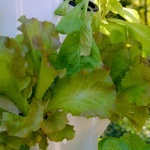



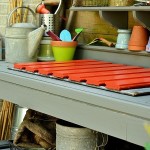
Thank Scotts!
Love my herbs. We live in sunny Florida and I’m working on a back porch kitchen herb garden. You all are great encouragers!
Thanks, S.
Thanks so much for reaching out and your encouraging words…much appreciated! I grew up in Orlando, so I know that your herbs love your sunny Florida days! Thanks again for reaching out and happy gardening! – D.
Great info! I have been wanting to plant herbs for a while now and this article is a great resource for when I finally start. Doug, what additional advice would you give for folks in apartments trying to grow herbs?
Thanks for chiming in Latoya! I think the biggest piece of advice for folks who live in an apartment is…since you’re having to use pots (I’m assuming)…just make sure to keep them watered appropriately. It’s tough to resuscitate them once they’re a bit too far gone!! Take care and good luck my friend! – D.
“Herb gardens are indeed a wonderful addition to any home, offering a wide range of benefits from culinary delights to medicinal and aesthetic pleasures. Do you have a favorite herb from your garden that you use frequently for cooking or other purposes? It’s incredible how versatile herbs can be!”